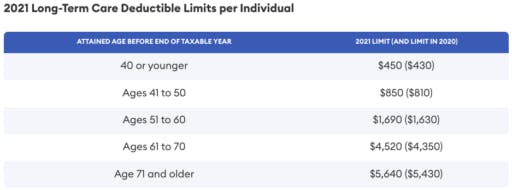Is Senior Home Care Tax Deductible?

The average family caregiver spends $7,242 every year on immediate medical needs for a loved one. As staggering as this number may be, it pales in comparison to the thousands of dollars that families must pay for surgeries and support services for seniors.
Thankfully, the Internal Revenue Service (IRS) realizes the strain these bills put on you and your family, so they developed a way to receive a medical expense deduction. And with tax season right around the corner, there’s no better time to learn everything you need to know so you can properly file your taxes.
Medical expense deductions can be a huge relief for anyone who has paid for their loved one’s assisted living communities or medical expenses. The good news: If you’ve paid for senior home care for an extended period in 2021, you may receive some deductions on your taxes.
Breaking Down Tax Deductible Senior Home Care Services
There are many medical services available that qualify for tax deductions. Specifically, if your loved one received medical services at home, they may meet the necessary qualifications.
The main stipulations are that any service your elderly family member received must be long-term care, and a doctor must certify that your family member was chronically ill within the last 12 months.
You must pay for long-term care from a nursing home, assisted living facility, or professional at-home care for tax deduction purposes. In other words, the “care” received must come from a licensed health care practitioner for you to deduct expenses for your family member’s care.
To that end, it’s essential to understand the meaning of chronic illness. While a broken limb or surgery is often a part of chronic illness, the two are not mutually inclusive. You can suffer a broken arm, have surgery to mend it, and not be chronically ill.
Healthline defines chronic illness as lasting a long period and as being incurable. Since chronic illness is debilitating, part of the qualifications for tax deductions is that the individual receiving help cannot do two or more Activities of Daily Living without assistance. Activities of Daily Living (ADL) include the following:
- Bathing
- Dressing
- Continence
- Cooking
- Cleaning
Since there is no cure for chronic illnesses, treatment is a necessity. If your loved one has met each of the prior qualifications, likely, their medical expenses qualify as well. Here are some reasonable costs to claim on your taxes:
- Prescription medicine
- Medical care doctor
- Medical exams
- Diagnostic test
- Nursing help
- Hospital care
- Programs to quit addictions (smoking, alcohol, food)
- Weight-loss programs
- Medical aids
- Surgery
- Lodging (only when traveling for medical treatment)–$50 per night per person
- Ambulance services
One final consideration is constant supervision for severe cognitive impairment (Alzheimer’s or dementia). If your loved one has a degenerative mental disease, you qualify for tax deductions.
How to Deduct Home Care Costs

Home care is a large umbrella that covers many types of medical care. For tax purposes, any medical care is referred to as nursing services, whether at home or in a hospital.
It would help if you first determined how much time a nurse spent with you doing tax-deductible services (listed above) to deduct nursing services. This clarification is crucial because washing dishes does not qualify for a tax deduction, but a nurse can complete this task while in your home.
Once you know how much time a caregiver worked, calculate the percentage of time spent doing job-specific tasks.
For example, let’s say you pay a visiting nurse $300/week for their help, but they spend 20% of their time doing non-medical tasks. To calculate how much you can file for a deduction, subtract 20% from $300. In this case, you could only file $240 since $60 is 20% of $300.
While household chores are not qualifying services to be tax-deductible under nursing services, they may be eligible under your long-term insurance.
Step #1: Consider The Insurance Policy
Your chronically ill family member’s insurance policy is a good indicator of what you can and cannot include as tax-deductible. You can put some of your medical costs towards your deductible if you have long-term health insurance. Your coverage must be strictly long-term—no hybrid or temporary coverage.
To see which expenses qualify add up your Adjusted Gross Income income and multiply by 7.5%. Depending on your age, your received deductible will differ. See the chart below to determine your deductible limit and only the portion that will qualify.

There are a few things to consider when looking at your loved one’s insurance policy. Every policy has some contractual agreement. The insurance contract qualifies if:
- It is renewable
- There is no cash surrender value provided
- Refunds are only used to reduce future payments (tax credit)
- If it does not pay or reimburse expenses that medicare reimburses
Step #2: Calculate Qualified Medical Expenses
Not every expense qualifies for a tax deduction, even from qualified medical care services. Here are some essential details about what you can and cannot include:
- Only include medical expenses from this year—no future costs.
- Do not include money paid by insurance companies.
To calculate your deductible from Schedule A, add up your total income and multiply by 7.5%. The final number gives you your baseline for deductibles. If your comprehensive deductible is more than 7.5% of your Adjusted Gross Income (AGI), you qualify on your tax return. If you were born after January 2, 1951, use 10% instead of 7.5%.
Step #3: File Your Taxes for Senior Home Care
There are a few forms to fill out when filing medical expenses. Begin with Schedule 9–here is an explanation of the document, and to help you and your senior determine what qualifies, use publication 502.
This extensive document highlights everything you need to know for tax season, including qualified assisted living costs for deductions if they are in connection to your loved one’s chronically ill condition.
Filing for these tax deductions is a laborious process and can leave you more confused than relieved. It might be helpful to meet with a tax professional who can go over everything with you and your loved one to get the most out of the deductible.
Conclusion
Every year, the chronically ill and their families spend thousands of dollars on medical care and services. If your family uses 24 Hour Home Care for your senior in-home care, you can apply the cost for tax deductions.
The sooner you and your loved one begin collecting assisted living expenses, the easier it will be for you to complete your taxes and get the most money back.
If you need tax-deductible in-home care, look no further than 24 Hour Home Care. Our expert and compassionate staff of caregivers are ready to help you maintain a high level of medical care in the comforts of your home. Schedule a free consultation today.
